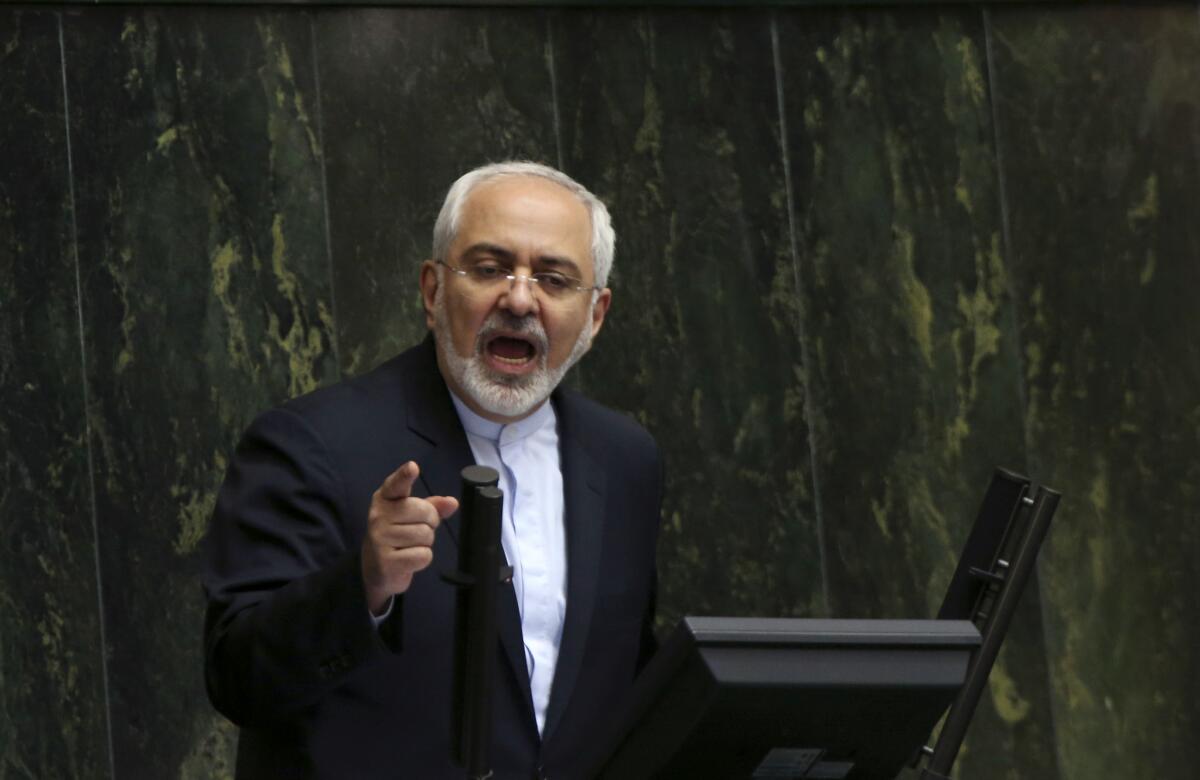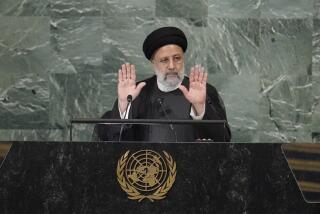Iran can deny access to military sites, foreign minister says

Iranian Foreign Minister Mohammad Javad Zarif, Iran’s top nuclear negotiator, addresses an open session of the parliament in Tehran on July 21, 2015.
Reporting from Washington — Iran can deny nuclear inspectors access to its military sites under the terms of the agreement worked out this month in Vienna, the country’s foreign minister said this week, raising new questions about Tehran’s commitment to the terms of the agreement.
Appearing before the conservative-dominated parliament to sell the nuclear deal, Foreign Minister Mohammad Javad Zarif said Iran’s negotiating team had held fast in the bargaining to the leadership’s pledge not to allow such inspections.
Iran had made access to military sites a “red line,” he said, and had “fully achieved” those terms in the bargaining.
He also told lawmakers that Iran had not committed to allowing inspection of military sites in the agreement, known as the Joint Comprehensive Plan of Action.
It’s unclear whether Zarif’s comments, which conflict with statements made by President Obama and his top aides about the nuclear agreement, represent a signal that the Iranians are trying to reopen a part of the deal or just an effort to provide a favorable spin on a contentious point.
Access to the military sites was a major issue in the nearly two years of bargaining that led to the nuclear deal. Iran, the United States and its bargaining partners -- France, Britain, Germany, Russia and China -- reached a deal July 14 that would lift sanctions on Iran’s economy in return for restrictions aimed at preventing Tehran from obtaining a nuclear bomb.
Iran’s supreme leader Ayatollah Ali Khamenei had said this year that Iran would never allow access to military sites for fear that inspections would disclose closely guarded secrets. Officials of the Islamic Revolutionary Guard, the elite Iranian military force, have continued to insist, even after announcement of the deal, that military sites should be off limits to inspectors.
But in signing on to the deal, Iran committed to accepting the so-called Additional Protocol, an agreement that allows United Nations inspectors limited access to any site where illicit nuclear activity is suspected. Iran also agreed to a “challenge inspection” mechanism in the deal that will allow a committee to decide whether inspectors can have access to such sites, even over Iran’s objections.
The government of President Hassan Rouhani, facing resistance to the deal from influential conservatives, is seeking to portray it as a victory for Iran. Zarif also said that it would be difficult for world powers to ever reimpose sanctions once the deal is underway because putting the economic restrictions back in place would threaten their countries’ expected growing business ties with Iran.
U.S. officials have suggested that in the hope of the making the deal more palatable to conservatives, Rouhani’s team may be making assertions it doesn’t intend to follow.
“Often comments are made publicly, and things can evolve that are different,” Secretary of State John F. Kerry said Monday in an interview with Al Arabiya news agency.
Times staff writer Richter reported from Washington and special correspondent Mostaghim from Tehran.
For foreign policy news, follow @richtpau
More to Read
Sign up for Essential California
The most important California stories and recommendations in your inbox every morning.
You may occasionally receive promotional content from the Los Angeles Times.











